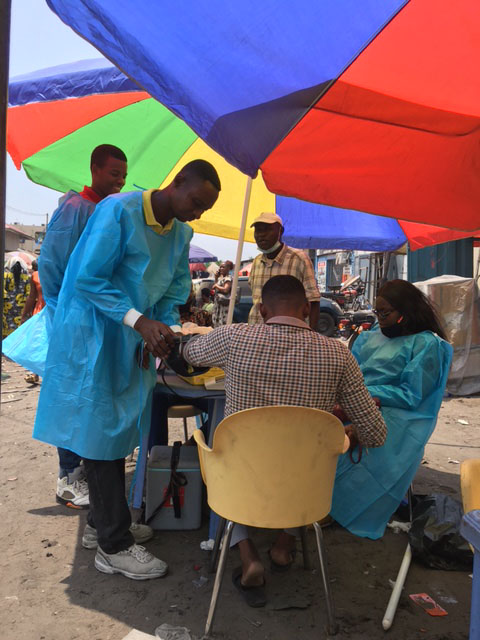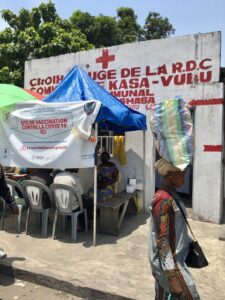“Standing Together” for COVID-19 Vaccines in the DRC
Published on August 1, 2022

On a busy, dusty street lined with shops and motorbikes in the sprawling metropolis of Kinshasa, two brightly colored umbrellas stood out. Healthcare workers Therance and Paulin welcomed people to the site of a mobile vaccination clinic. Smiling, they asked visitors a series of basic questions to ensure they were ready to receive a no-cost COVID-19 vaccine as they cheerfully answered any questions. “Many people have misconceptions about the vaccine and the consequences it may have on their bodies,” explained Dr. Therance, “Some are just curious. We explain what it is and they often decide to take the shot.”
One of those drawn to the umbrellas was Nicole, a housewife. “I came back from the market and saw the team vaccinating some passersby and I stopped,” said Nicole. “I didn’t know where to go to get vaccinated. The presence of this mobile site on my way back home is perfect for me.” Doudou, a bus driver, agreed. “I must get vaccinated to avoid getting sick and stop working. I can’t afford it. The only solution for me is vaccination and I am very happy that the site is located next to our bus station.”
Therance and Paulin were part of a focused effort that succeeded in vaccinating 24,555 people against COVID-19 in Kinshasa Province.
The Need for COVID-19 Vaccinations is Urgent
The Democratic Republic of the Congo (DRC) has one of the lowest COVID-19 vaccination rates in the world. By February 2022, just over one percent of the population (about 54 million people) had received one dose of the vaccine, and less than one percent were fully vaccinated. In Kinshasa Province, the vaccination coverage was 0.8 percent of the targeted population, according to the DRC Expanded Programme on Immunization (EPI.)
The USAID MOMENTUM Routine Immunization Transformation and Equity project is working with the DRC EPI to increase COVID-19 vaccination coverage in the Kinshasa Province to at least 15 percent. As part of these efforts, the project supported the EPI and partners, including USAID Breakthrough ACTION, to deploy outreach teams in Kinshasa Province in two 2-week phases: 30 outreach teams brought COVID-19 vaccines to the community during the first phase from February 14 to 27, 2022, while 35 were deployed during the second phase, March 21-April 4.
Each outreach team included two nurses, two community health workers, a data clerk, and a security person. The community health workers used megaphones to explain the importance of the COVID-19 vaccine. The nurses administered the vaccinations and the data managers entered records into the national registry. Vaccination sites included churches, mosques, police stations, and marketplaces.
Each location drew large numbers of curious passersby. At the edge of a busy market in East Kinshasa, a team set up a site along a wall of the Kinshasa provincial police station and a health center run by the Red Cross in the Kasavubu District. “We work hard, but it pays off,” said Jean, a nurse on one of the district’s outreach teams, “More than 50 people get vaccinated every day since we arrived.” Due to the location, more than half of the police working nearby were fully vaccinated, according to a proud Lieutenant Guy Santa, deputy chief of the station: “We have the solidarity to fight and beat COVID-19. In the DRC, it is called Tuko Pamoja, or we stand together.”

The Results Show Large Increases in Vaccinations
Making vaccinations more accessible to people has clearly had an impact in Kinshasa Province. A total of 8,081 people were vaccinated in the first phase and 16,474 were vaccinated in the second, for a total of 24,555 people vaccinated across Kinshasa. The increase between the two phases was thanks in large part to the project’s use of data to adjust the strategy by increasing the number of outreach teams, improving the communications component of the campaign, and increasing the flexibility of the outreach sites during the second phase. In addition, the proportion of doses given to women improved to 37 percent from 32 percent over the four-week period, partly due to a special focus on recruiting female leaders and strengthening peer outreach.
The outreach approach was so successful that it is now included in the EPI COVID-19 Acceleration Plan. MOMENTUM also supported a nine-day vaccination campaign that began on April 14 in Kinshasa Province. Using teams at fixed, mobile, and outreach sites, 31,215 people out of a total target population of 117,237 in all the Kinshasa health zones were vaccinated free of charge.

